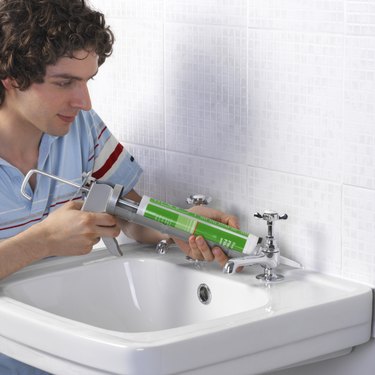
Creating a waterproof seal between two materials, such as metal and thin plastic, requires using the correct bonding compound. When selecting an appropriate sealer, decide how flexible you need the two materials to be once you join them. The level of desired flexibility plays into the selection because some bonding compounds dry significantly more rigid than other sealants.
Epoxy
Video of the Day
Polyepoxide, or epoxy, is a type of hardening compound formed from a combination of epoxide resin and a synthetic polymer. Epoxy has uses as a general purpose adhesive and as a reinforcement agent for plastic. It can act as a waterproof seal between a thin piece of plastic and metal provided you don't expect the joined surfaces to move. Epoxy forms a hard bond and works best on clean, inflexible materials. If the plastic piece you want to secure to metal isn't rigid, then epoxy will have a difficult time curing to the plastic.
Video of the Day
Plumber's Putty
Plumber's putty is a flexible, white material that retains its softness even when dry. It adheres well to porous surfaces, including plastic and fiberglass. The substance is useful for creating a waterproof seal between plastic and metal, including in shower drains and bathroom sinks. Using an oil-free plumber's putty eliminates the need to scrub the joining surfaces before applying the compound.
Roof Sealant and Plastic Sealant
Roof sealant is a hardening material designed for outdoor plumbing and roof applications. The bond it establishes is waterproof and adheres well to metals and plastics. Roof sealant can withstand damage from the elements and is suitable for repairs to outdoor gutters, cooling towers, chimneys and skylights.
A general plastic sealant can provide a waterproof bond between metal and plastic for indoor plumbing joint repairs. The compound dries like rubber and does not shrink.
Plumber's Caulk
Plumber's caulk forms a flexible, long-lasting bond between a variety of surfaces, including plastics and metals. This waterproof sealer is highly resistant to mildew, which makes it an ideal choice if you need to close gaps in shower doors, bath tiles or drains. Painting over caulk with a latex paint or oil-based paint is possible. That factor gives you decorating options if you want to match a room's colors or hide signs that you used the sealant to repair damage.